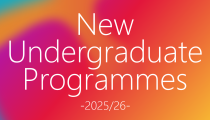Sept 2025 Entry
2 years
64
One-off entry scholarships will be awarded to applicants with excellent academic achievement.
Early applications are strongly encouraged.
What's New
-
To provide an advanced education in dietetics that blends rigorous academic coursework with practical, hands-on training in clinical, community and food service settings.
-
To cultivate a deep understanding of the science and clinical practice of dietetics, including medical nutrition therapy, nutritional assessment and dietetic counselling.
Upon completion of this programme, students should be able to:
-
Utilise professional skills and knowledge to provide individualised medical nutrition therapy, which includes performing nutritional diagnosis, designing individualised meal plans, providing nutritional counselling and recommending nutritional supplements when appropriate;
-
Provide nutrition services to the healthy as well as to those with chronic illnesses;
-
Analyse and apply research methods in a variety of nutrition and food systems studies and settings;
-
Demonstrate critical thinking, communication skills and analytical abilities to identify and solve problems in the nutritional sciences.
Professional Recognition
Curriculum design is based on the accreditation requirements from local and oversea professional bodies. The programme is seeking the professional bodies for recognition.
Prospects
Graduates of this programme have a wide range of career opportunities in various sectors, such as healthcare, food industry, research, education and public health.
With increasing awareness of the importance of nutrition, there is growing demand for qualified dietitians who can provide expert advice on diet and nutrition. In addition, graduates of the MSc in Dietetics programme can work in hospitals, clinics and other healthcare settings, providing personalised nutrition plans for patients with various health conditions.
Additionally, there are opportunities for dietitians to work in the food industry, developing and promoting healthy food products, as well as in research institutes, conducting studies on the impact of diet on health.
Graduates of this programme can also pursue careers in the education sector, teaching and providing nutrition and dietetics training, or in the public health sector, promoting healthy eating habits in communities to prevent diet-related diseases.
Overall, the prospects for graduates of the MSc in Dietetics programme are promising, with a wide range of career opportunities and the potential to make a significant impact on public health and community well-being.
Students enrolled in the MSc in Dietetics programme are required to complete the following courses:
- Academic Integrity and Ethics in Science
- Advanced Diet Therapy and Medicine
- Advanced Human Physiology and Anatomy
- Advanced Pharmacology and Nutrition
- Chinese Medicine Based Diet Therapy
- Clinical Biochemistry and Molecular Nutrition
- Clinical Dietetics and Medicine I
- Clinical Dietetics and Medicine II
- Capstone Project
- Dietetics in Practice
- Dietetic Placement I
- Dietetic Placement II
- Dietetic Placement III
- Food Preparation and Menu Planning
- Nutritional Assessment
- Nutrition Education and Counselling
- Professional Practice for Dietitians
- Public Health Nutrition
- Research Methods & Data Analysis
64
Dr Li Shi-ying, Christine
BSc, MSc, PhD, RNutr (UK)
- A Bachelor’s Degree with Honours in Food Science, Food Technology, Nutrition, Biology or Health-related, or other relevant/related science disciplines; AND
- Applicants should have obtained credits for each of the following pre-requisite university undergraduate level courses before admission to the programme:
- Human Physiology (3 credits or the equivalent); AND
- Biochemistry (3 credits or the equivalent); AND
- Principles of Nutrition (3 credits or the equivalent)
If you are not a native speaker of English, and your Bachelor's degree or equivalent qualification is awarded by institutions where the medium of instruction is not English, you are expected to fulfil the University’s minimum English language requirement for admission purpose. Please refer to the "Admission Requirements" section for details.
For further programme information, please contact us via email: msc.dietetics@polyu.edu.hk
Class Arrangement
Classes are scheduled on weekdays during the daytime and evenings and on Saturdays during the daytime during the academic year, including the summer term.
Placement Arrangement
Dietetics Placement is divided into three phases. Dietetics Placement I mainly takes place in the food and catering service industries. Dietetics Placement II mainly takes place in community settings such as nursing homes. Dietetics Placement III mainly takes place in hospital settings. Placements are mainly conducted on weekdays and weekends during the daytime.
6 for local students
12 for non-local students
Please click here to download.
HK$7,700 per credit for local and non-local students. Tuition fee will not be charged for the 1-credit subject, Academic Integrity and Ethics in Science.
One-off entry scholarships will be awarded to applicants with excellent academic achievement.
Required
Optional
Optional
Required
Applicants are required to submit the official results or proof for the prerequisite university undergraduate-level courses Human Physiology (3 credits or the equivalent), Biochemistry (3 credits or the equivalent) AND Principles of Nutrition (3 credits or the equivalent)





